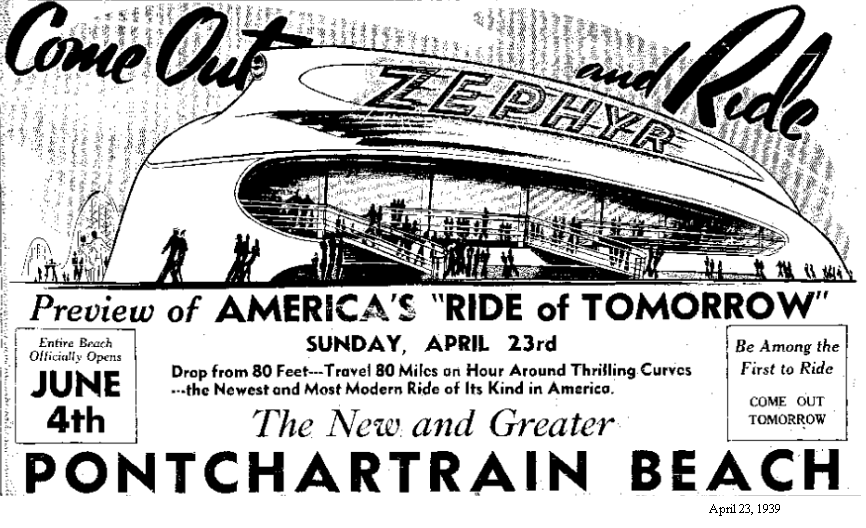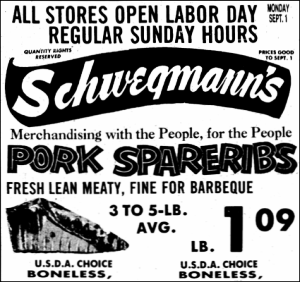|
Today in New Orleans History |
|
|
January 19


 On
January 19, 1954. the statue of Confederate General Robert E. Lee was hoisted back up to his pedestal. The year before, major
renovations to the deteriorating foundation of the seventy-year-old Lee Monument, required that the statue of Robert E. Lee
and its tall pedestal be dismantled and stored away. When the repairs were completed, the statue was replaced and General
Lee resumed his perch over Lee Circle, with his back to the North. [Louisiana Photograph Collection. General Interest
Collection] (Photo and text from the New Orleans Public Library) Prior to the erection of the monument in February 1884, the location was known as Tivoli Circle.The bronze
statue that tops the Doric column was sculpted by Alexander Doyle who also designed the massive
bronze equestrian of General P. G. T. Beauregard at the entrance to City Park (1915); and the bronze statue of General Albert Sydney Johnston atop the Army of the Tennessee cenotaph and “Calling the Roll”
(1885), a marble of an unknown Confederate soldier (both in Metairie Cemetery), and the statue of Margaret Haughery
(1889) off St. Charles Avenue near the Interstate.  

To receive an update for each day in New Orleans
history, join our facebook page
- Today in New Orleans History
Father Antonio de Sedella, better known as Pere Antoine, a Capuchin friar, passed away on January 19, 1829 amid the love and tears of the whole city. This wonderful old man, adored for his benevolence, came to the province of Louisiana in 1779. He is supposed to have performed nearly one half of the marriage and funeral ceremonies for the inhabitants of the city, until his death, at the ripe old age of 90. He lies buried at the foot of the altar of the St. Louis Cathedral, of which he was the Cure (or pastor) for the parish, for nearly fifty years. The St. Louis Cathedral, an ancient and interesting edifice of New Orleans facing Jackson Square or “Place d’Arms” as it was known in those days, stands today on the very site where the first house of worship was erected by Bienville and his pioneers in 1718. It is filled with historic lore and has witnessed the principal events which occurred since the founding of the city up to the present time. The local Masonic Fraternities took a conspicuous part in the funeral procession. A notice in the Louisiana Courier of 1829 reads as follows: “Masons of all rites and of all degrees, to you we address ourselves, remember that Father Antoine never refused to accompany to their last abode the mortal remains of our brethren and that gratitude now requires that we should in turn accompany him with respect and veneration he so well deserved.”
Judah Touro, born on June 16, 1775 in (Newport, Rhode Island, was an American businessman and philanthropist. In New Orleans, he used his business profits to buy and endow a cemetery, and to build a synagogue, an almshouse and an infirmary for sailors suffering from yellow fever, as well as a Unitarian church for a minister named Mr.Theodore Clapp whom he greatly admired. The infirmary became the largest free hospital in Louisiana, the Touro Infirmary. He was a major contributor to many Christian charities in New Orleans, as well as to such varied causes as the American Revolutionary War monument at Bunker Hill, and the relief of victims of a large fire in Mobile, Alabama. In a New Orleans fund-raising drive for Christians suffering persecution in Jerusalem, he gave ten times more than any other donor. One profile of Touro particularly praised his willingness to give both to Jewish and non-Jewish religious causes: "An admirable trait evinced, was the unsectarian distribution of charity, while the donor ever continued a strict adherent to the principles of his faith." His $20,000 donation to The Jews' Hospital in New York City (now Mount Sinai Hospital) led to its opening in 1855. He died on January 19, 1854 in New Orleans. (WIKI) The Conseil de Ville resolved and approved, on January 19, 1832, that the mayor
shall have $300.00 paid to Mr. George Weiss, on account on his contract for the inscription of names on streets. |
|
|

To receive an update for each day in New Orleans history,
join our facebook page - Today in New
Orleans History.
Analytics |
 Robert E. Lee Returns
Robert E. Lee Returns
